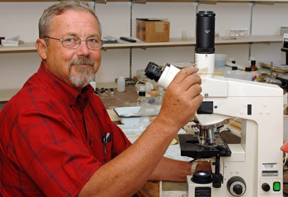ISU old-school scientist Kritsky is world-renowned parasitologist
August 16, 2007
Administrative and teaching duties pay the bills, but it is the pinhead-sized and smaller parasitic worms inhabiting fish gills that are the true research love of Dr. Delane Kritsky, associate dean of the Kasiska College of Health Professions at Idaho State University.
While Kritsky has studied a broad range of parasites, he is a world authority on a type of small flatworm known as the Monogenoidea in the genus Gryodactylid, a scientific grouping of the animal. This may sound like an esoteric interest to the average person, but Kritsky’s research has sent him all over the world and his expertise has attracted inquiries from scientists around the globe.  Since he began studying these worms in the mid 1960s, his research interest has taken him to South America, Mexico, Australia, India, China, several European countries and throughout North America. He has identified hundreds of new species of these critters and studied their natural history. Sometimes the objects of his studies are sent to him, other times he has canoed through tropical rivers in the jungle to catch his own fish and their associated parasites.
Since he began studying these worms in the mid 1960s, his research interest has taken him to South America, Mexico, Australia, India, China, several European countries and throughout North America. He has identified hundreds of new species of these critters and studied their natural history. Sometimes the objects of his studies are sent to him, other times he has canoed through tropical rivers in the jungle to catch his own fish and their associated parasites.
Kritsky, also a full professor in the health and nutrition sciences, had his initial scientific training in zoology. Not many people can call themselves parasitologists, but that is what Kritsky is ¬ someone who studies parasites, their hosts and the relationship between them.
“I use the worms as a model to study biogeographical evolution, trying to understand where animals live and the factors that placed them there,” Kritsky said. “We’re using these worms as a model to understand their distribution on a global basis.”
This kind of basic research can help scientists understand broader issues.
“In my mind, there’s a value in just understanding nature and knowing about nature,” Kritsky said. “In the 1930s we knew little about this group of worms, but now we have people all over the world studying them. We’re not only learning specific information about this group, but we can use them as a model. When you have specialized knowledge about this group it is possible to extrapolate information and utilize it to explain other things.”
An example is a group of fish, with associated parasitic worms, that live in the freshwater of South America whose closest relatives are ocean-living, saltwater fish. Working with a colleague at the Federal University in Parana, Brazil, Kritsky correlated the evolutionary history of the fish and the geographic history of South America and came up with a hypothesis the fish invaded South America 20 million years ago during a time when ocean waters receded from the land mass. “Our knowledge of the parasites associated with the fish helped strengthen the hypothesis of the origins of these fish.”
As a specialist, Kritsky is a parasitologist, but at a more basic scientific-practicing level he is a taxonomist, a biologist who specializes in the classification of organisms into groups on the basis of their structure, origin and behavior. Within his specialty he can accurately tell you what is what.
Basic taxonomy comes in and out of fashion as a scientific field. This type of work isn’t as sexy, perhaps, as using expensive machines to examine the composition of DNA, and it isn’t the kind of research that is likely to bring in six- and seven-figure National Science Foundation grants. Kritsky’s research vocation requires pain-staking analysis examining the small parasites under a microscope and using his overall knowledge of the animals to properly identify them.
“I’ve received great support from Dean Linda Hatzenbuehler (Kasiska College of Health Professions dean) to pursue my interest, but overall there is little money in basic taxonomy and there is minimal funding support at a national level,” Kritsky said.
This is a disturbing trend to Kritsky. There is a lot of talk about the importance of biodiversity and our understanding of it that potentially effects the way everything from how fisheries to forests are managed. At the same time, there are fewer and fewer experts available who have the basic and vital knowledge and skills to identify organisms such as parasite species.
“Two years ago a biologist was studying an endangered pup fish in the White Sands area of New Mexico,” recounted Kritsky. “He was working on the ecology of this fish and found a worm on it. He absolutely could not find anybody who could identify the worm. He contacted me and to help him out, I put out a paper on this species and named the organism so he could accurately report on the ecology of this fish.”
Kritsky said he is one of only a few scientists left in the United States that he knows of that is working on this group of worms on a regular basis. In his laboratory he has stacks of specimens that have been sent to him by people requesting Kritsky to identify them, but he does not have time to get to many.
“You’re getting molecular biologists who don’t know anything about the animal they’re studying. They just grind it up and analyze it, and it is getting difficult for them to even identify the organism. It’s a real problem,” Kritsky said. “It’s almost like taxonomists like myself are on the way to extinction.”
And that could have important ramifications on the basic understanding of our world.
Categories:
